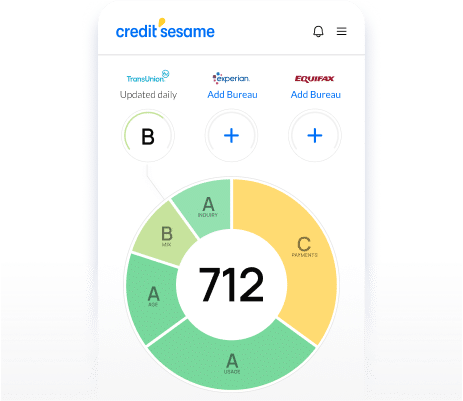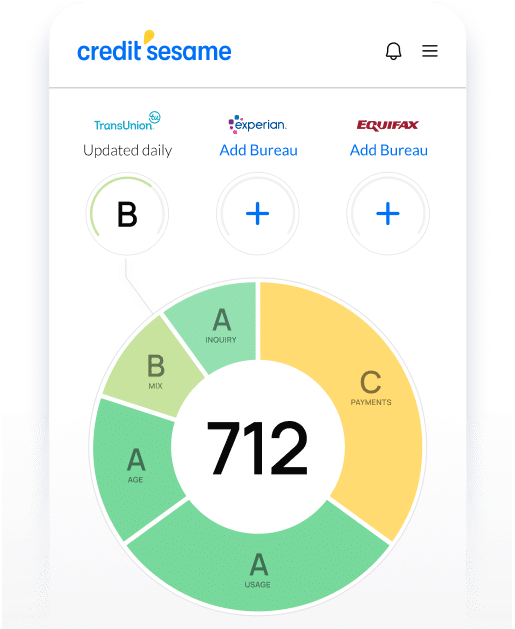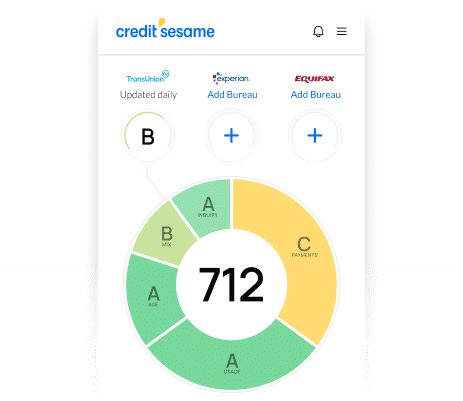How to build credit
The reason to build credit is that it is a measure of how reliable you are at repaying borrowed money. Credit refers to the ability to borrow money, like getting a loan or credit card. Before a financial institution extends credit, they want to know how likely you are to pay back what you borrow, plus any interest and other charges. They look at your credit history in your credit report and your credit score. If you have good credit history and credit score, you are considered to be reliable. The higher your credit score, the better.

Get your free credit score
Start today. The sooner you know your baseline score, the sooner you can start to build credit history.
By clicking on the button above, you agree to the Credit Sesame Terms of Use and Privacy Policy.
What does building credit mean?
Unless you are one of the few Americans with the highest credit score, there is almost certainly room for improvement. Even if you have a good or excellent credit score, you can likely improve it further. Individuals with the highest credit scores tend to receive better interest rates on borrowed money.
If you are establishing credit for the first time it can be especially challenging because until you have used credit, lenders have limited ways to assess your ability to repay debt.
It’s even tougher if you’ve had past problems with credit. Any credit mistakes are recorded on your credit history and impact your credit score.
Whether you’re trying to get credit for the first time, rebuilding credit after some bad experiences, or improving your existing credit, there are common methods to build credit.
How do you start building credit? How do you build the type of credit record that can help you reach your financial goals?
Why is it important to build credit?
To a large extent, lenders assess your ability to repay credit in several ways including taking a look at your history of using credit. There are two primary tools for doing this:
Your credit report
As soon as you start using credit, anything you do with credit may be reported to any or all of three major credit bureaus and added to your credit reports. The three main credit bureaus, Equifax, Experian and TransUnion keep a record of your credit activity and each has a separate credit report for you. So, in fact, you have at least three credit reports. These three credit reports may have slightly different information, depending on what has been reported, but all include details of:
- How often you’ve applied for credit, even if you did not succeed
- Credit accounts that you have opened and closed
- Repayments made on time, late, or missed completely
- How much you owe
Your credit score
The items in your credit report paint a picture of how you use credit, and how you’ve used it in the past. That record is summed up in a credit score, a three-digit number typically ranging from 300 to 850. The higher the credit score, the more you are considered trustworthy with credit.
How to build credit
Building credit starts with engaging in the type of activity that goes into a credit report. This means having one or more credit accounts, borrowing money in that account, and then making payments on it. The key to building a good credit score is to use it regularly but moderately, and consistently make your payments on time.
Essentially, you need to establish a track record of using credit, whether it is for the first time, to rebuild credit or further improve fair your existing credit status. The key is to build a history of making your payments on time and using credit in a way that shows you are responsible
Getting your first credit accounts
First-time borrowers often have trouble getting a loan or qualifying for a credit card. This is because they lack any record of using credit successfully. Here are some of the easiest pathways to beginning to use credit:
- Student loans. The federal student loan program makes loans very accessible to people who want to continue their education. These loans can do more than help you afford a degree or training. They can also give you an opportunity to show you can be relied on to make your loan payments on time.
- Secured credit cards. A secured credit card requires that you put down a deposit in order to open the account. This deposit helps reduce the risk for the credit card company, so they are more likely to approve an account for someone without much of a credit record.
- Authorized user. This means that someone with a credit card account grants you permission to use the account. This can be a good way for parents to let their kids start using credit for the first time. However, you and the account owner need to be aware that each of your actions affects credit history for both of you.
- Special credit builder accounts. There are special accounts, like Sesame Cash, that have a credit builder component. They are designed to give you limited access to credit in a way that can help you start to establish credit.
Establishing a positive payment history
For new and existing credit accounts, the next step in building credit is to use it consistently. Your history of making payments is the number one factor that goes into your credit score.
If you have a loan, your payment schedule should be mapped out for you. Most likely, there is a set amount due every month. Each of those payments goes towards building your credit history.
If you have a credit card, try to use it at least once a month. Then be sure to make at least the minimum payment on each statement by the due date.
Using credit responsibly
Making your payments on time is very important to building credit. However, using credit responsibly starts even before you borrow money.
Before you take on the responsibility of debt, you have to plan for how to repay it. For a loan, that means figuring out whether you earn enough to make the payments along with meeting your other expenses.
For a credit card, handling it responsibly means using it more as a cash substitute than as a means of long-term borrowing. Credit card interest rates are high relative to other types of credit. That makes it an expensive way to borrow long-term.
If you find your credit card balance keeps growing, you’re on a course that may not be sustainable. Eventually, you use up your credit limit and cannot borrow anymore. Payments become more and more expensive.
When possible, try to pay off your credit card balance in full each month. At the very least, try to pay more than the minimum amount. This helps reduce your interest costs and makes sure you still have credit available for future use.


Rebuilding credit
It’s challenging to get your first chance to use credit. It’s even harder to get another chance after you’ve had trouble with credit. Rebuilding credit means you have to both address past problems and start building a new and better track record. These same principles apply whatever your starting point.
Identifying credit problems
If you’ve used credit before and now have a low credit score or have recently been turned down for credit, it’s a sign that there may be problems on your credit report.
The first step to addressing this is to get a copy of your credit reports. Go through each and make a list of things that may be dragging your credit score down. Then figure out how to address each item. Some solutions may improve your credit quickly, while others take longer. Either way, the sooner you get started the sooner you can start raising your credit score.
Quick fixes
Here are some things that can have a rapid impact on rebuilding credit:
- Correct any mistakes on your credit report.
- Pay any overdue bills.
- Pay down your credit balances to get them below 30% of your credit limit
Longer-term fixes
Here are some things that can take longer, but ultimately help your credit score:
- Start making payments on time. It can take years for missed payments to drop off your credit score, but if you start establishing a positive payment history eventually it replaces the bad parts of your record.
- Stick to a budget that doesn’t require continuous borrowing. There’s no point trying to fix mistakes only to keep repeating them.
- Work out a payment plan for bills you can’t afford to pay right away. Don’t hide from your creditors if you can’t pay your bills. Figure out how you could pay them if you only had more time or lower interest rates. Then negotiate to see if your creditors may accept your terms. They want to get paid, and if you can offer a plan that increases their chances of that happening, they might agree.
What can harm your credit building?
Whatever your reasons for wanting to build credit, you should beware of things that frequently sabotage people’s credit scores:
- Missed payments. Being late on a single payment can hurt your credit score, and failure to pay at all drags your score down for years to come. This is especially bad if a creditor has to assign part of your debt to a collections company.
- Stretching your credit to the limit. Both the total amount you owe and the percentage of your available credit that you’re using affect your credit score. So, the closer you come to maxing out your credit cards, the more it’s going to hurt your credit.
- Having debt written off. It’s one thing to negotiate with a creditor for easier repayment terms. However, if a creditor writes off debt because they conclude you won’t pay it, it has a very negative impact on your credit score.
- Opening too many accounts at once. Both recent activity and the age of your accounts affect your credit score. Opening too many new accounts in a short period of time looks risky to lenders. Even applying for too many accounts at once creates a pattern of credit inquiries that may be a cause for concern.
- Closing old accounts. People sometimes think that having fewer credit accounts might make them look less risky. However, having older accounts helps your credit score, so think twice before you close one.
- Failing to have a mix of credit accounts. Your mix of credit accounts matters. It’s best to have both loan (installment) and credit card (revolving) accounts. Paying off a loan counts as closing an account, so you don’t always have a choice in the matter. Just be aware that it might hurt your credit score.
Credit monitoring
If your goal is to build credit, you need to monitor progress. Consider signing up for credit monitoring. This is a service that alerts you to new credit activity and changes in your credit score.
Credit monitoring helps you track your progress toward building credit, and can alert you to potential problems. Your credit record is valuable, so it’s well worth watching out for it.
In a nutshell
The most challenging part of building credit is getting started, but after that, it's an ongoing effort. Even after years of responsible credit use, mistakes could drag down your credit score.
It’s good to adopt a credit-building mentality and develop responsible habits from the start. Good habits become almost effortless after a while, so they help you build and maintain a positive credit record.
If you're trying to rebuild credit after some mistakes, it may take a while, but in time improved credit responsibility starts to influence your credit score more than your past mistakes.
Building credit takes time, regardless of starting point. Ideally, you should start working on building a good credit history before you need credit. That way, you are ready to access credit when the time comes for something really important, like buying a house or a car.

Do more with your FREE score™
Check your score right away and see the factors impacting your credit
By clicking on the button above, you agree to the Credit Sesame Terms of Use and Privacy Policy.
Share this
More related articles

Check your credit score for FREE
Checking your score to see where you stand is FREE and does not impact your credit.
How to improve credit score
What affects credit score
How to establish credit
See your score.
Reach your goals.
See your score. Reach your goals.
Begin your financial journey with Credit Sesame today.
Get your FREE credit score in seconds.
By clicking on the button above, you agree to the Credit Sesame Terms of Use and Privacy Policy.















